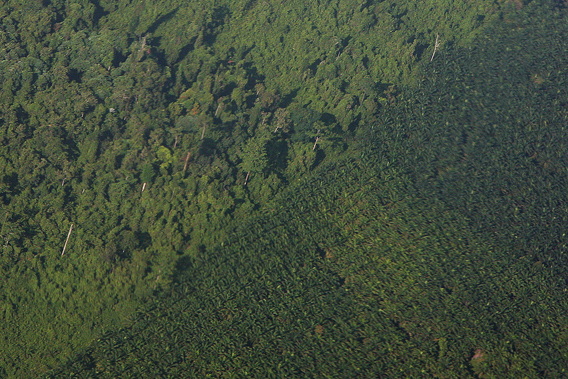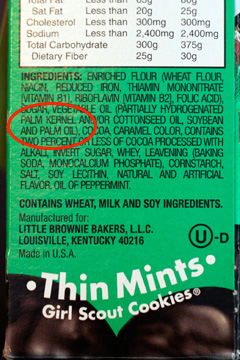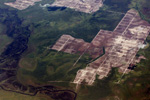
Oil palm and logged over rainforest in Sabah, Malaysia. Photo by Rhett A. Butler 2008.
Girls Scouts USA has censored its Facebook page after receiving comments criticizing the organization, according to Rainforest Action Network (RAN). RAN along with Change.org and two Girl Scout activists, Rhiannon Tomtishen and Madison Vorva, declared today a social media day of activism against the Girl Scouts for using palm oil in their popular cookies. The oil has been linked to rainforest destruction in Indonesia and Malaysia.
According to RAN, after receiving around 50 comments on its Facebook page, Girl Scouts of the USA “removed every last one and altered the settings on their Facebook page so that no individual comments or links from fans could be posted there. Those individual messages cannot be retrieved.”
The Girl Scouts Facebook page is now allowing comments, but only under a single thread under this announcement: “This morning, Girl Scouts was the focus of an article regarding Palm Oil in our cookies. Our bakers exclusively source palm oil from members of the Roundtable on Sustainable Palm Oil.” At the time of publication this thread has received over 350 comments.

Palm oil is now found in up to half of packaged processed foods, including Girl Scout cookies. By virtue of its high yield, palm oil is a cheaper substitute than other vegetable oils. In an effort to reduce costs, some candy makers are using palm oil in place of cocoa butter in their milk chocolate products. Photo by Rhett A. Butler |
The Roundtable on Sustainable Palm Oil (RSPO) is the official body that sets environmental and social standards for the production of sustainable palm oil. However, Rhiannon Tomtishen and Madison Vorva are asking Girl Scouts to take palm oil completely out of the cookies. According to a petition the activists are concerned that RSPO has not yet been able to fulfill its promises, contending that RSPO member companies have been “documented clearing forest, peatland and critical wildlife habitat while ignoring human rights—all of which are prohibited in the RSPO principles and criteria.”
After meeting with Girl Scouts execs in 2008, Tomtishen and Vorva have not heard from the organization related to their concerns.
RAN accuses Girl Scouts USA going against its mission to empower girls to be leaders in order to make a better world and then “[making] the decision to censor the comments of scores of its young leaders rather than listen to their concerns about the use of rainforest-destroying palm oil in its famous Girl Scout cookies.”
Girl Scouts USA has responded to allegations of censorship on the Facebook page with this message: “Girl Scouts of the USA welcomes interaction, discussion, commentary, questions and criticism but ask that comments are kept relevant and respectful. GSUSA reserves the right to remove comments or ban anyone who violates these guidelines. Personal attacks, inappropriate language, spamming and excessive posting will not be tolerated.”
Palm oil is the world’s most productive oil seed (far outstripping soy, which has been linked to deforestation in the Amazon), but is responsible for a significant percentage of deforestation in Malaysia and Indonesia. For example, a study in Conservation Letters found that 55-59 percent of palm oil plantations in Malaysia built between 1990 and 2009 occurred on forested land.
Such aggressive deforestation has contributed to an environmental crisis in the region: biodiversity loss in some of the world richest habitats, conflict with indigenous groups who depend on the forests for their livelihood, and substantial greenhouse gas emissions.
While some palm oil is now being produced more responsibly, Girl Scouts USA hasn’t committed to greener palm oil for its cookies.
Related articles
Losses from deforestation top $36 billion in Indonesian Borneo
(04/29/2011) Illegal forest conversion by mining and plantation companies in Indonesian Borneo has cost the state $36 billion according to a Forest Ministry official.
RSPO: Labeling palm oil as an ingredient is fine, provided other oils are labeled too
(04/21/2011) The Roundtable on Sustainable Palm Oil (RSPO), a body that sets criteria for social and environmental certification of palm oil, weighed in on the debate on Australia’s proposal to require listing of palm oil as an ingredient on package labels. At the same time the RSPO announced its own labeling initiative to distinguish products that use RSPO-certified palm oil from those that do not.
Malaysian palm oil giant in fight with forest people gets rebuke from RSPO
(04/06/2011) A Malaysian palm oil company facing criticism for a land use dispute with forest people in Borneo has been suspended from the Roundtable on Sustainable Palm Oil (RSPO), an eco-certification body.
World Bank to resume lending to palm oil sector after 18-month moratorium
(04/03/2011) After a two-year moratorium triggered by complaints over social conflict between local communities and palm oil companies, the World Bank has announced the adoption of a framework to restart lending to the palm oil sector. The framework was developed after months of consultations with stakeholders, including the private sector, NGOs, farmers, indigenous communities, development experts, and governments.
German bank dumps palm oil company stock

(03/25/2011) DWS, a fund management company run by Deutsche Bank, has dropped all Wilmar International stock from its financial products over concerns that the palm oil giant has failed to produce palm oil in a responsible manner despite being a member of the Roundtable on Sustainable Palm Oil (RSPO), a eco-certification initiative. The move follows a campaign by Robin Wood, a German activist group.
5 million hectares of Papua New Guinea forests handed to foreign corporations

(03/23/2011) During a meeting in March 2011 twenty-six experts—from biologists to social scientists to NGO staff—crafted a statement calling on the Papua New Guinea government to stop granting Special Agricultural and Business Leases. According to the group, these leases, or SABLs as they are know, circumvent Papua New Guinea’s strong community land rights laws and imperil some of the world’s most intact rainforests. To date 5.6 million hectares (13.8 million acres) of forest have been leased under SABLs, an area larger than all of Costa Rica. “Papua New Guinea is among the most biologically and culturally diverse nations on Earth. [The country’s] remarkable diversity of cultural groups rely intimately on their traditional lands and forests in order to meet their needs for farming plots, forest goods, wild game, traditional and religious sites, and many other goods and services,” reads the statement, dubbed the Cairns Declaration. However, according to the declaration all of this is threatened by the Papua New Guinea government using SABLs to grant large sections of land without going through the proper channels.
Palm oil company gives up land contested by local communities as part of sustainability pledge

(03/21/2011) An Indonesia palm oil company has relinquished part of its plantation concession to communities that traditionally use the land as part of its commitment to sustainability principles under the Roundtable on Sustainable Palm Oil (RSPO), reports the Forest Peoples Programme. The move is a response to a new procedure that could reduce conflict between palm oil developers and forest-dependent communities.

(03/11/2011) McDonald’s announced a far-reaching sourcing policy that could significantly reduce the fast-food giant’s impact on the environment, including global forests. Yesterday McDonald’s unveiled its Sustainable Land Management Commitment, a policy that requires its suppliers to use ‘agricultural raw materials for the company’s food and packaging that originate from sustainably-managed land’.
Kellogg switches to ‘greener’ palm oil
(03/08/2011) Kellogg Company will support greener palm oil production through the purchase of ‘sustainable’ palm oil certificates until it can obtain a segregated, sustainable supply, said the food giant in a statement.
Major palm oil companies failed to secure proper permits in Indonesian Borneo
(02/23/2011) Some of Indonesia’s biggest and most powerful palm oil companies appear to have failed to initially secure the proper permits to convert rainforests to oil palm plantations in Central Kalimantan, reports Greenomics, an Indonesian activist group.







